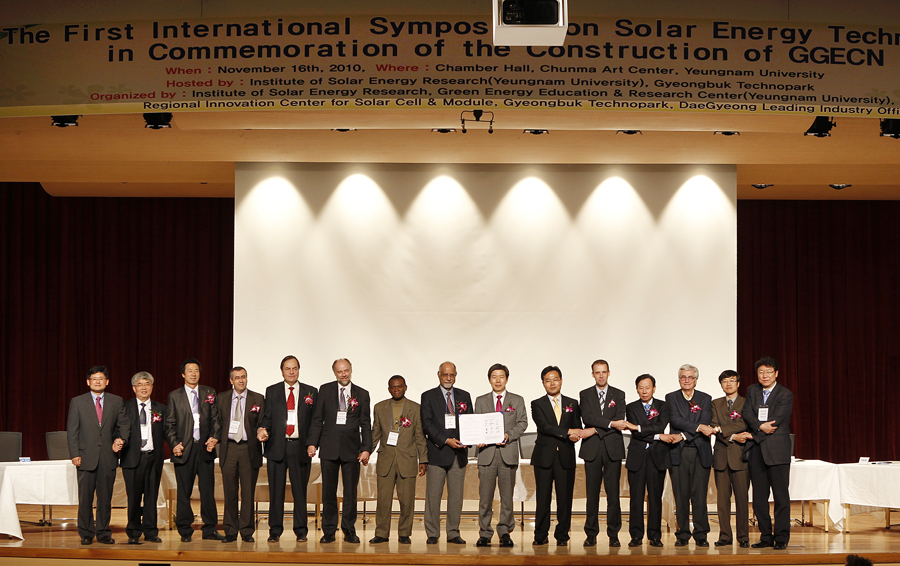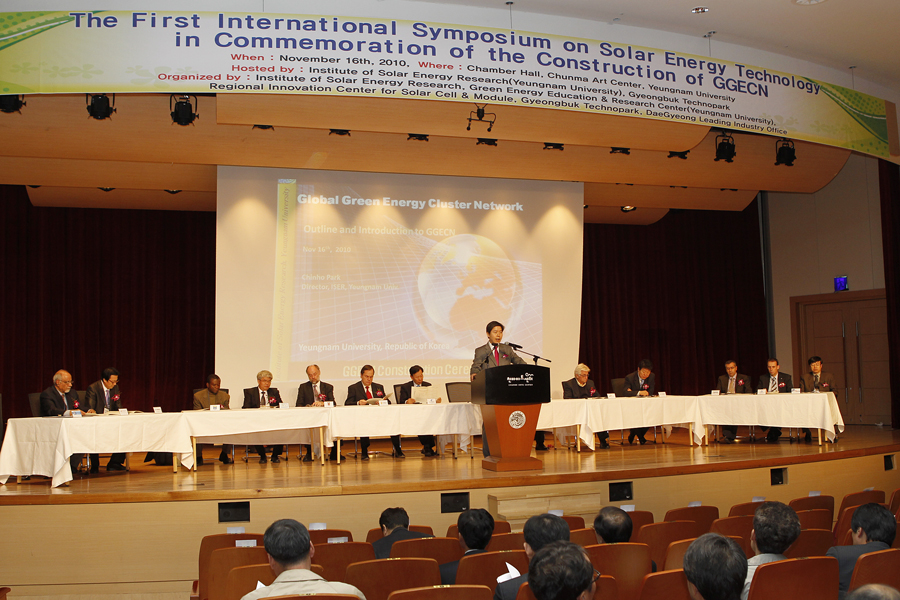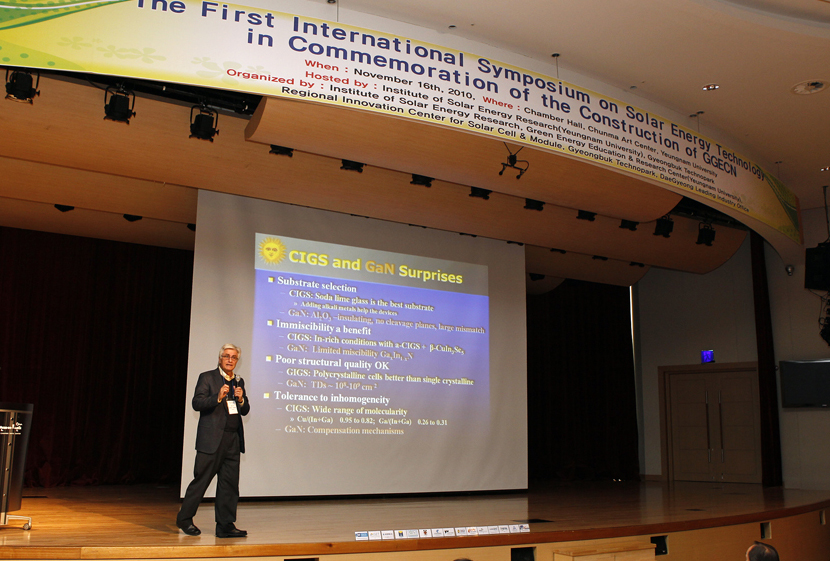Leading research institutes on green energy of Korea, US, Germany, France and Australia gathers at Yeungnam University
Announces construction of 'Global Green Energy Cluster Network'
[Nov 16, 2010]

The 'Global Green Energy Cluster Network', which vowed international cooperation in R&D and industrialization of green energy technology for the future society, was officially launched in the afternoon of the 16th at the Yeungnam University Chunma Arts Center Chamber Hall.
We have now passed the 'age of global competition' and are entering the 'age of global cooperation'. At its center stands the Republic of Korea. As to prove this, the G20 summits came to Seoul to exchange ideas for international economic cooperation such as in exchange rate policies, and now, global figures have come to Yeungnam University to search for ways for international cooperation in the solar energy sector.
Yeungnam University (president Lee, Hyo-soo) proclaimed the start of the new age of global cooperation after making an agreement with establishing the GGECN (Global Green Energy Cluster Network) to connect Korea, US, France, Germany and Australia in the afternoon of the 16th at the Chunma Arts Center Chamber Hall.
Lee, Hyo-soo, who was the keynote speaker, emphasized in his speech titled, 'GIFT plan & GGECN for Sustainable Green Growth', that the entire world must come together to develop environment-friendly green energy in order to overcome the crisis of mankind caused by climate-change as soon as possible. In particular, he presented the three directions of 'development of new technologies for environment-friendly green energy', 'energy saving technology development in existing industrial fields', and 'innovation of energy saving consumption' for the 'GIFT Plan', and proposed international cooperation for the future of humankind. This also meant what the global cooperation network must aim for in the green energy sector as well.
President Lee stated, "With the construction of the GGECN, we now lay the cornerstone for the GIFT plan, and information exchange and research cooperation in the green energy sector will be possible from a global aspect." He added, "Yeungnam University's GIFT plan will be a big gift not only for the future, but for today's world as well.

While introducing the three directions in the green innovation sector, which has been promoted by Yeungnam University for the future of humanity, Lee, Hyo-soo also proposed to open up the age of global cooperation in his keynote speech.
Institutes participating in the GGECN are core institutes that have already led the research and industries of the solar energy sector in their respective nations. In Korea, centering on Yeungnam University's Institute of Solar Energy Research, Solar Cell/Module Materials and Process Regional Innovation Center, and the Daegu-Gyeongbuk Economic Belt Green Energy Education & Research Center, Gyeongsangbuk-do, the Gyeongbuk Technopark, Daegu-Gyeongbuk Leading Industry Development for Economic Region, and the Daegu-Gyeongbuk Regional Energy Climate Change Center, as well as the foreign-invested company ISET (International Solar Electric Technology) will be participating. From the US are participating FESC (Florida Energy Systems Consortium), University Center of Excellence for Photovoltaics Research and Education at Georgia Tech, and CRSP (Center for Revolutionary Solar Photoconversion). InESS (Institute of Electronics for Solids and Systems) of France, and TÜV Rheinland of Germany, and University of New South Wales of Australia join in the network.
They have gathered at Yeungnam University to promise global cooperation in development of green energy for the future of humanity. They aimed at agreeing to make collaborative efforts for effective research and education in green energy sectors such as solar energy, hydro-energy, wind energy, geothermal heat, bio-mass, atomic energy, etc, and establishing sustainable development policies, while making representative communication channels from the respective countries.
Accordingly, Yeungnam University and Gyeongsangbuk-do became not only the center for green energy in Korea, but debuted in the international stage as the center of global cooperation. Yeungnam University will play a role in connecting companies, institutes, research centers and universities of the domestic green energy sector with that of the US, France, Germany and Australia. In addition, it will play the role of brokering domestic consulting of world-renowned scholars in the green energy sector.
As part of this, Yeungnam University is planning to drive the details of the private collaboration with InESS of France. InESS is a world-class green energy research institute located in Alsace, France, which has a sister-relationship with Gyeongsangbuk-do, and it is within the University of Strasbourg, which is also a sister-university of Yeungnam University. The US FESC, CRSP, UCEP, and Australia's UNSW also promised student exchange programs, joint research, and Shared-use of solar cell manufacturing pilot lines. FESC is the world's largest solar energy consortium that is combined with companies, colleges and research centers in the solar energy sector in Florida. CRSP is a consortium in Colorado with members such as the US NREL (National Renewable Energy Laboratory) which is recognized as a world-class green energy research center.
In addition, by the agreement which has also been made with Germany's TÜV Rheinland Yeungnam University will directly operate the world-class solar cell module international certification and evaluation center from 2011. Furthermore, it agreed to cooperate in attracting foreign investments with the US ISET to promote the Daegu-Gyeongbuk region's CIS thin film solar cell industry.
Thus, through the establishment of the fusion research paradigm, Yeungnam University has got a green light for 'Green Innovation', which is one of the 'Global Frontier 10-3-10', which is the university's goal to become one of the top 10 universities in 3 research areas within 10 years. It has already prepared 88 billion won in national funding, and has constructed world-class partnerships now. Thus, it has increased the possibility for the success of Yeungnam University's 'GIFT (Green Innovation For Tomorrow)' plan, which aims at preparing a gift for following generations through green innovation.

Professor Park, Chin-ho (52, School of Display and Chemical Engineering), who is the director of the Yeungnam University Institute of Solar Energy Research and worked hard day and night for the establishment of GGECN, expected "GGECN will help upgrade the research capacities of the domestic solar energy sector to world-class levels, and it will not only foster human resources, but also contribute in cutting R&D investment costs of companies, and maximizing productivity."
Meanwhile, prior to the establishment of GGECN, at 1pm on the 16th, the 'First International Symposium on Solar Energy Technology' (photo), in which world-renowned scholars in the solar energy sector participated en masse, at the Yeungnam Chunma Arts Center Chamber Hall. This was an opportunity to identify the present and future of the world's solar energy technology.
On the 17th, the 'Global Green Energy Cluster Network Symposium' will be opened as a special session of the '2010 World Green Energy Forum' hosted by Gyeongsangbuk-do.












